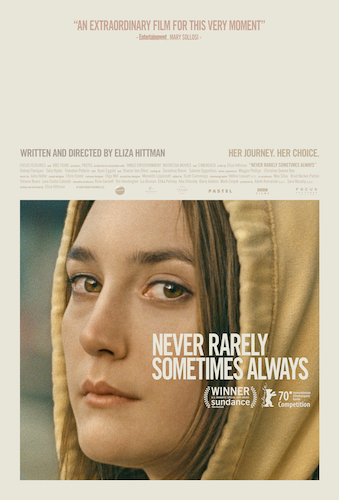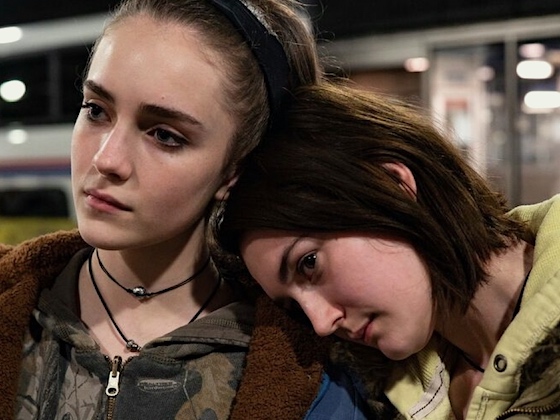Eliza Hittman | 101 mins | digital (HD) | 1.85:1 | UK & USA / English | 15 / PG-13

Autumn (Sidney Flanigan) is a teenage girl from rural Pennsylvania, and she’s pregnant. She’s young, her family clearly aren’t well off, she’s not in a relationship with the father — the film explains none of this to us explicitly, but it’s all clear. So is it any wonder that Autumn decides she wants an abortion? Her local sex health clinic’s attitude is to show her a video about why it’s evil. Her conservative parents obviously wouldn’t understand; especially, you think, her dad, who is at least verbally abusive. And so with the help of her cousin, Skylar (Talia Ryder), they scrape together what little money they have, throw a simple lie in the parents’ direction, and set off for New York City, where Autumn can get the procedure without parental consent.
Clearly, Never Rarely Sometimes Always is not impressed by the state of things in the US of A. It’s an indictment of what women have to endure to have control over their own bodies. The so-called “Land of the Free” isn’t so free for some people. All this is stuff many of us know, thanks to recent political movements and counter-campaigns to change women’s rights. But by showing us a ‘case study’, as it were, of one girl’s experience, writer-director Eliza Hittman makes the real-world effect of these political decisions so very tangible. (It’s interesting that the film is quite prominently a UK coproduction. One suspects that non-US influence and/or cash injection may’ve been necessary.)
Lest you think the film is some kind of feminist polemic, it comments on all of this without ever saying much of it explicitly. It is, if anything, a witness statement; a factually-stated case from which we infer the unjustness of the system because we are capable of empathy. (The natural counterpoint being that, of course, if you showed it to certain groups they’d not feel the same level of care or compassion, but that’s their failing as human beings.) Despite the big issues at play, and these unavoidable conclusions, it’s a subtle and quiet film, with much left unsaid. The scene which gives the film its title is a series of questions posed to Autumn before she can have the abortion. Some are just yes/no answers; some she can’t even bring herself to respond. They’re not specific enough to tell us what exactly has happened in her life, but they indicate and hint at so much. And that’s ok — we don’t need to know the totality of her personal experience to empathise with what she’s going through now; just that she’s not coming from a loving, supportive place that might make it all a bit easier.

As Autumn, Flanigan is incredible; doubly so as it’s a debut performance (apparently she beat over 100 actresses for the role. Well done, casting director!) Like the film, she conveys so much with so little; so much bottled up emotion. Skylar is a great character, too: so supportive, but not incapable of feeling her own emotions. At one point, as the trip unexpectedly drags on over several days, it all gets a bit much and she has to go off by herself for a bit. That kind of behaviour helps accentuate the realness of events — even when you want to be supportive, sometimes you need a little break. No one’s perfect. Ryder has a couple of minor credits to her name, but both girls deserve to go on to much more on the strength of their work here.
Some viewers will find the film’s style too slow, too wandering, aimless; but, for me, that further underlined the reality. All that time spent just getting from place to place, or just waiting around until it’s time — that’s life. Indeed, for me, it only heightened the film’s tension, which crushes in all the time, throughout. Or perhaps not tension, exactly, but worry; uncertainty; anxiety. What’s going to happen? What’s going to go wrong? How are they going to deal with this, that, and the other? Horribly, this is probably what it’s like to be a young woman a lot of the time, especially in America. That’s the film’s power: it takes a real-life experience lived by so many, and it doesn’t just show it to us, it makes us feel it.
At one point, a professional tells Autumn that “whatever your decision is, is totally fine, as long as it’s yours.” It’s a moment of much-needed kindness, because, in Autumn’s experience, that is not how things are — but it is how they should be.

Never Rarely Sometimes Always is available on Sky Cinema and Now TV from today. It placed 2nd on my list of The Best Films I Saw in 2020.

Hmm, this will have to go on my ‘to-watch’ list.
LikeLiked by 1 person
I will say, as some kind of caveat, that Sky Cinema themselves have given it 1.5 stars — though I don’t really get that, for two reasons.
(1) it’s not a great way to promote your content!
(2) I can fully understand this is not a film for everyone; it’s the kind of film where some people would probably say “nothing happens”. But when you’ve got an issue like this, which is affecting people right now so acutely, doing away with movie histrionics and presenting it with a high degree of realism seems a wholly appropriate way to handle it, to me.
LikeLike